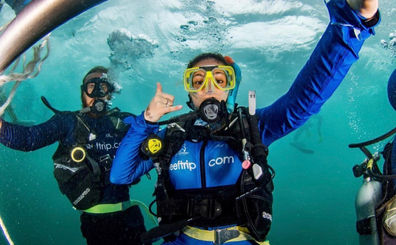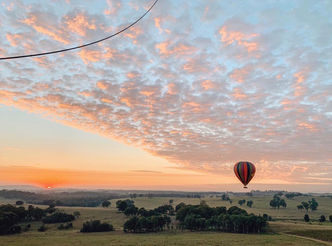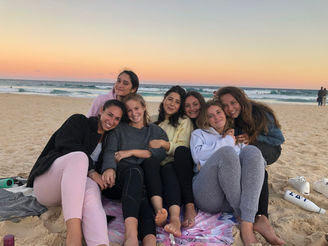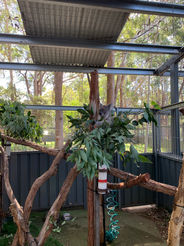
STORIES/
EPISODES

STORIES/
EPISODES

EPISODE 2/
SYDNEY
Hi Dani! Welcome to Not Your Mom’s Travel Guide, a podcast exploring traveler’s guilt.
Hi Shley.
Dani is a current senior at the University of Michigan, studying Biopsychology, Cognition and Neuroscience. Next year she’ll be working in a research lab before she heads off to medical school. Dani actually spent her second semester of her junior year at the University of New South Wales in Australia.
Yes, I did.
So, just to get the ball rolling, could you tell us a little bit about your time studying and living abroad in Australia?
Yeah, so it was honestly the best semester of my life.
Amazing.
I really loved getting to just, you know, immerse myself in Australian culture and I got to live in an apartment with a few other girls from different universities studying abroad in Australia. It was really incredible getting to live on the beach and just getting to--
That’s amazing.
-- do that every single day. I went to the University of New South Wales like you said and it was a really cool experience because I was actually going to school with other students from Australia.
Yeah, like locals instead of just study abroad students.
Exactly and I think that’s really unique.
Yeah, I definitely didn’t get to experience that myself so that’s really cool.
Yeah, it was really awesome.
So did you travel throughout the country at all when you had time off school or on the weekends? Can you tell us a little bit about that?
Yeah, I definitely got to travel a lot. I went to Melbourne. I went to the Gold Coast. I got to go to South Australia. I went to Lord Howe Island and I’m really fortunate that I got to go to all of those places and honestly Australia is one of the most beautiful places in the entire world. Everything is blue and green and it’s just incredible. I got to go scuba diving and I saw rainbow fish and coral and it was just incredible and so beautiful.
Yeah, and I know you kind of had a tough time looking back on your experiences and all of those amazing things that you got to be able to see and do and explore at the beginning of our senior year because of all the destruction caused by the forest fires in Australia. And definitely the Australia you knew is not the same Australia now, just one year later and I think that was probably also surreal for you because you just saw all of the current juniors’ pictures there when they got there in January. I remember seeing Snapchats of people there and the skies were not blue. They were grey and it looked as if everything was dull there, which is not your experience at all. Can you just talk a little bit more about that?
Yeah, of course. I mean, when it first started happening, of course, I was a little in denial. I didn’t think it was as bad as it actually was, but then we actually started hearing about it. Everything on the news and everything through social media and it was just crazy how bad it got. Yeah, it made me really sad because that was my home for five months and I couldn’t believe it was on fire. It was just devastating. Something that really stood out to me with regards to the year younger going there was when I saw two different Instagram posts back to back on the same beach. One where these girls pretending like they were surfing, having the best time and then, another was these girls on the exact same beach on the same day and there was just ash all over the beach. And I was just like wow. This is crazy.
That’s really powerful.
It’s really powerful to see people who are pretending like it’s not there to show, to show the world that they’re having the best abroad experience and that nothing is wrong. And then there were the people who were there acknowledging this is our beach right now. It’s covered in ash and it was just crazy to see that and it breaks my heart. It was just so sad.
Yeah, that’s horrible. And obviously, tourism is a huge component of Australia’s economy.
Right, of course.
And the loss from the fires was absolutely devastating. I don’t know if you know what they’ve estimated it at, but the Australian Tourism Export Council estimated that the industry will actually take a loss of 4.5 billion Australian dollars for the year.
Oh, wow.
Yeah, it’s crazy and obviously that affected some more than others. Some people are more affected by the tourism industry than others in Australia and I know that your family has been in touch with some of the locals that you guys met when your parents were visiting Australia, visiting you there, since they left. Can you talk about the folks on Kangaroo Island and kind of how they’ve been impacted by the fires?
Yeah, of course. So Kangaroo Island is this small island off the coast of Sydney and my parents got to go there when they were visiting me and basically the entire island is devoted to seeing kangaroos and different wildlife. They have the most beautiful and extensive wildlife there and the entire island is just devoted to tourism, basically.
It’s what they rely on.
Exactly and then after the fires, entire homes, communities were taken out. So many of the animals lost their lives and basically everything the island had was wiped away. And my parents were in touch with some of the people they stayed with when they were there and they were telling them how all they were doing was just trying to clean up after the fires and try to get them to calm down and just rebuild their lives because everything was taken away from them. They were just doing everything they could to help the animals and just get resources to just make sure everyone was surviving because people were also dying from it. It’s just so sad.
Yeah, and can you talk about the guilt that you personally felt about this situation and how you’ve been handling it since you’ve been back and all of that?
Yeah, so when I was in Australia, a few times I actually went to koala sanctuaries and we got to see the koalas who-- this was obviously before all the fires-- we got to see koalas who were either hurt in the wild and they were taken into the sanctuary or just from smaller fires. They were taken in and I just can’t even imagine how much those sanctuaries were needed after these fires and how many animals lost their lives. I really had a lot of guilt being over here because I felt there was nothing I could do. I mean, I obviously sent money over to some of the animal relief funds to help, but--
In any way you could.
In any way I could, but me being here I can’t physically do anything. I can’t help heal these animals. I can’t be there so I’ve definitely felt really sad that there wasn’t more I could do besides give money and hope that the people who are there are really doing their jobs and helping everyone the best that they can, which I know they are.
Yeah and traveler’s guilt is kind of a funny thing because if you are traveling to these places you have the privilege to be able to leave these places when they come down on hard times. And a lot of these people that your parents are in touch with, that you encountered while you were there, they don’t have that same luxury and that’s the horrible part about all of this.
Right, definitely.
Yeah, so thank you so much for coming and sharing your experiences.
Yeah, thanks for having me!
Of course. We talked a lot about the economic dependence on tourism in Australia and how climate change and the tourism industry intersect which I know gave me a lot of insight into something that I haven’t experienced directly myself. So that was amazing. And for those of you listening that would like to contribute to the relief efforts that are still ongoing, I’ll link to some resources page. And thank you so much, Dani!
Yeah, of course!












